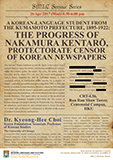
| News & Events |
| 26 April 2017 | |
Talk: Dr. Kyeong-Hee Choi Room 4.36, Run Run Shaw Tower, Centennial Campus, HKU |
|
Few national literary traditions accord the figure of the censor with a separate analytic status for literary scholarship and historical writings, unlike the creative writer, the reader, the critic, the editor, and the translator, among others. Not only does the censor rarely appear in today’s literary histories but also its individual identity is often concealed, except in confidential police records. As a product of Japan’s systematic pre-publication censorship from 1905 to 1945, the history of modern Korean literature, however, cannot be fully narrated without dealing with the censor’s proscriptive and prescriptive acts on Korean vernacular journalism, which contributed to the rise to modern Korean literature. This paper offers an account of the professional trajectory of Nakamura Kentarō (1883-1969), the sole censor of Korean-language newspapers during the Protectorate Era, focusing on his education, social network, and colonial career in Korea. By doing so, it sheds light on the censor’s dominance in absentia on the surface of modern Korean literary publications. |
|
